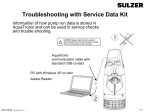Download User guide LT3100
Transcript
LineTroll 3100 User Manual This document describes the Installation-, configuration and use of LineTroll 3100/3100K/3100T Rev. 2a Date: 24.11.06 3 06.02.08 4 04.09.08 Description: Information about the Xenon-flash version added Ext DC +/GND for relay card corrected Added info reg transient faults, new prog.table, For LT 3100 (not 3100K) manuf. From 2008 possible to choose both 2,5A and 4A + minor corrections Minor changes in description of installation + reset-input Sign. TV TV TV Information in this document is subject to change without notice. No parts of this documentation may be reproduced in any form by any means without the written permission of Nortroll AS. Copyright 2006 Nortroll AS. All rights reserved. All Nortroll products are trademarks or registered trademarks of Nortroll AS. Other product names are trademarks or registered trademarks of their respective holders. 2006 NORTROLL AS P.O.Box 133 7601 Levanger Norway www.nortroll.no 0 Contents CONTENTS 3 DEFINITIONS 4 1. LINETOLL 3100 OVERVIEW. 5 2. FUNCTIONAL DESCRIPTION. 6 ADAPTIVE DETECTOR OPERATION CRITERIA Inrush blocking time: Fault current passage: Circuit Breaker (CB) tripping: INDICATION LED indication Dual mode: Relay operation Dual mode: RESET CRITERIA Voltage reset Automatic timer-reset Manual reset 6 7 7 7 7 8 8 9 9 9 9 9 3. APPLICATIONS 10 LINETROLL 3100 IS SUITABLE IN: DO NOT USE LINETROLL 3100 ON: 10 10 4. APPLICATION NOTES 11 LINE SWITCHING Connecting a healthy line Connecting of faulted line when indicator is not indicating FAULTS Permanent fault Second fault while indicating a previous fault AUTOMATIC RECLOSING Non-successful reclosing Successful reclosing FUSED LINES MULTIPLE FAULTS CAPACITIVE DISCHARGES SETTING AND LOCATION SENSITIVITY Earth faults LineTroll 3100 monitors the resulting magnetic field under the line. Short circuit faults Recommended distances 11 11 11 12 12 12 12 13 13 14 14 14 16 16 16 16 16 16 17 5. PROGRAMMING 18 SENSITIVITY 18 TIMER RESET CB TRIPPING WITHIN 5 OR 10 SEC. VOLTAGE RESET. PARAMETERS 18 18 18 19 6. MAINTENANCE 20 BATTERY MONITORING REPLACEMENT OF BATTERIES 20 20 7. LT 3100 TECHNICAL SPECIFICATIONS 21 Maximum sensitivity for magnetic field (B-field): Blocking time for inrush: Indication criteria: Required fault duration Indication LED Reset: Battery External dc: Ambient and storage temperature Built inn short range radio: Housing Material Dimensions & Weight: Test standards: EN60529 Classification of protection degree (IP-ingress) Climatical test 21 21 21 21 21 22 22 22 22 22 22 22 23 23 23 23 8. DIMENSIONS 23 9. MOUNTING INSTRUCTION 24 GENERAL: COMMISSIONING MOUNTING RESET TEST INSTALLATION 24 24 24 25 25 25 10. RELAY CARD CONNECTION 26 LineTroll 3100 with relay card Relay card connection diagram 26 26 Definitions As the terminology may differ from country to country we will throughout this presentation use the following definitions: Short circuit fault Earth fault Transient fault LineTroll LED Xenon flash Circuit breaker Inrush blocking Energized De-energized - Phase to phase fault - Single phase to ground fault - Intermittent fault - LT - Light emitting diode - High intensity strobe flash - CB - Inrush restraint - Line with voltage present -Line with no voltage present Page 4 Userguide LineTroll 3100 February 2008 1. LineToll 3100 OVERVIEW. LineTroll 3100 series consist of three versions the LineTroll 3100K, 3100 and 3100T (For differences see technical specification) The LineTroll 3100 is used to locate short-circuit and earth faults in overhead line distribution networks. LineTroll 3100 is a 3-phase unit fully covering the different fault configurations that may occur. The indicators are placed at strategic locations along the line such as after branching points and sectionalisers. It mounts on the pole, 3-5 meters below the conductors by means of screws or wrappingbands. Live line mounting is done safely, easily and rapidly. Upon detecting a fault on the line, the indicator gives off an intermittent LED flashing or an optional Xenon flash. This flash can be seen within 200-300metres distance (for Xenon up to 1,5 km at night) during night. The lens of the indicator can be turned to either side for optimal visibility Figure. 1. Indicators during a fault situation Upon fault sensing, all indicators installed between the feeding substation and the fault will operate. The indicators placed behind the fault remain idle. LineTroll 3100 provides fast fault location enabling reduction in outage times. This represents enhanced service to the customers thereby improving the utilities image. Another important aspect of using fault indicators is that unnecessary operations of circuit breakers and sectionalisers to locate faults are avoided. This way the indicators help to reduce wear and tear as the reclosing cycles causes stress to the switchgear. Page 5 Userguide LineTroll 3100 February 2008 2. Functional Description. LineTroll 3100’s fault sensing is based on detection of the electromagnetic field below the conductors. The unit is fully self-contained, no external transformers or connections of any kind are required. To determine whether or not the line is faulted, the indicator is looking for a specific sequence in the line conditions to happen before it starts flashing. The general sequence is as follows: (ref. fig.2) 1. The line should be energised for at least 5 seconds. 2. The line current should increase rapidly above the value set by the user (the nominal trip level). 3. The line should be de-energised. Figure 2. Fault sequence. However, the user might program the criteria for operation to suit his local requirement by manipulating a bank of micro-switches inside the indicator. 2.1 Adaptive detector The measured magnetic field (=B-field) is applied to an adaptive dB/dt detector. This detector automatically adjusts to the normal conditions on the line. Slow variations in load current will not affect the detector. A fault current will cause a rapid increase in the B-field which the detector will respond to. The detector will now require that two conditions is satisfied: Page 6 Userguide LineTroll 3100 February 2008 1. The relative increase dB is greater than a certain level. 2. The absolute increase dB T is greater than a pre-set value. The second condition is the trip-level, which can be set by the user to different values; see section for Programming. The corresponding B-field can be found by using the formula: BT=0ISET/(2d) where 0=410-7 (free space permeability) ISET= 4, 7, 15 or 50A d= 3m (distance conductor-indicator) Example: ISET=7A => B=0.47T 2.2 Operation Criteria As mentioned the indicator is looking for a specific sequence. This sequence requires the following criterion to be fulfilled to activate the indicator: Inrush blocking time: The line voltage has to be present for approximately 5 sec. before any fault current will be detected. This blocking time avoids indication upon magnetising inrush currents during line energising. Fault current passage: The fault current has to generate the required increase in the magnetic field as described in section 2.1. If these two criteria are fulfilled the fault is detected and stored. Whether the fault should be indicated or not depends on what happens on the line and how the indicator is programmed. Circuit Breaker (CB) tripping: Setting: CB-trip enabled: Line de-energised within 5/10 sec: => Indication Line not de-energised within 5/10 sec: => No indication Setting: CB-trip disabled: => Indication not dependent on de-energised line. NB! If programmed for voltage reset the indicator reset after 15/30 sec if the line is not de-energised within this time. Page 7 Userguide LineTroll 3100 February 2008 LINE > 10 s I <5s t = INDICATION CB-trip enabled t CB-trip disabled t Fig. 3. CB-tripping If LT 3100 is to be used in a network with no tripping due to earth fault the CB-tripping must be disabled to obtain indication of earth fault. If these two criteria are met in the correct sequence, the indicator starts indicating. Indication Please note that LT3100 are also available with a Xenon-gastube as the main indication. This is described in next chapter. 1. LED indication Dual mode; transient and permanent fault indication The indicator can be set both to indicate permanent as well as transient faults. Permanent faults: 3 Red LED’s or Xenon-flash Transients faults: A single Green LED (Dual mode only activated if CB trip is set to ON) With the optional Xenon flash, the flash pattern follows the RED LED’s. NB: XENON Fast Auto Reclosing Fault Last Reclosing Non-successful Fault Fast Auto Reclosing Page 8 Userguide LineTroll 3100 February 2008 Relay operation Dual mode: If indicator supplied with Relay-card, two NO relay contacts are available for connection to a RTU for remote indication. The transient relay closes (1 sec), 5 sec (or 10) after the fault occur, even if the fault develop to a permanent fault or not. Fault Last Reclosing Non-successful Fast Auto Reclosing Line current XENON INDICATION Transient Fault Relay 5 sec Permanent Fault Relay 40 sec The Permanent relay closes if the fault sequence is considered as a permanent fault, and remains closed until indicator is reset. Reset Criteria The indicator can be reset in three different ways: 1. Voltage reset Automatic reset on return of voltage: Voltage reset can be programmed to: i) OFF, ii) ON, delayed 15 or 30 sec 2. Automatic timer-reset Programmable to: 1.5, 3, 6 or 12 hours. 3. Manual reset LineTroll 3100 can be reset by turning the lens clockwise to "RESET" position. A magnet is permanently mounted in the lens. A special hot-stick-attachable tool is available for resetting of the indicator from the ground when mounted on a pole. Page 9 Userguide LineTroll 3100 February 2008 3. Applications The application of LineTroll 3100 usually requires a previous line survey so that the best use of it may be obtained. For the best economic benefit it is recommended that the indicators are used: In easily accessibly line points for easy monitoring of the indicator in case of fault, for instance near the road. It is advisable to take binoculars. Before and after line points difficult to reach (mountains, woods, etc.) to quickly locate the fault. Next to lines branching points, to easily locate the damaged branch. When installing indicators at such points, the use of indicators in every branch is recommended in order to provide complete information in the event of fault. Not doing so may cause confusion since there may be an indication in a branch due to a nonpermanent fault while another branch without indicator may be faulty yet considered healthy. Near line points with sectionalisers to rapidly pinpoint and isolate the fault to facilitate rapid reconnection the healthy sections. LineTroll 3100 is suitable in: 6-66kV distribution networks 66- 175kV (LT3100-T) > 175kV (contact NORTROLL AS) Radial lines. Isolated-neutral networks. Solidly-earthed-neutral networks. Resistance-earthed-neutral networks. Single and 3-phase network Do not use LineTroll 3100 on: 1. Poles: with underground cables with T-offs with double circuit lines with sectionalisers with distribution transformers closer than 300 metres to 220-440 kV lines closer than 150 metres to 132 kV lines closer than 100 metres to 66 kV lines closer than 50 metres to 33 kV lines closer than 35 metres to 22 kV lines Page 10 Userguide LineTroll 3100 February 2008 2. Lines protected with fuses 3. Ring lines or multiple feed lines. 4. Line points where capacitive discharge current from the network downstream exceeds trip level can activate the indicator. 5. Nearby trees 4. Application Notes The aim of this section is to describe how the LineTroll 3100 indicator behaves in different service situations and network events. Line Switching Connecting a healthy line As the magnetising inrush current of a line can be very high, the indicator is provided with a 5 seconds blocking of the dB/dt sensor which prevents it from being activated until the line current is stabilised. Once the blocking time has elapsed, the indicator is enabled for fault detection. See fig. 2. Connecting of faulted line when indicator is not indicating This will not cause any indication for the same reason as for connection of a healthy line. The blocking time will avoid any indication. LINE I t NO INDICATION t Fig.8. Connecting a faulty line Page 11 Userguide LineTroll 3100 February 2008 Faults Permanent fault Permanent faults will be indicated by red LED’s. The time out for the LED can be set by the user to 1.5, 3, 6, or 12 hours. If the line is restored within the time-out, the LED’s will reset, assuming that the voltage reset is enabled Fault Last Reclosing Non-successful Fast Auto Reclosing Line current INDICATION 5 sec Transient Fault Relay 40 sec Permanent Fault Relay Fig.5 Permanent fault. Second fault while indicating a previous fault If a second fault occurs whilst the LT 3100 is indicating a previous permanent fault the indicator will continue to indicate for the first fault. Before it can detect the next fault while indicating a permanent fault, it must be reset. Transient (temporary) faults If the fault is cleared on the automatic re-closings and the line returns back to normal service; a single green LED will flash for 24 hours. During this 24 hours period the indicator is ready to detect new faults. If the new fault is a permanent fault, the indicator will start indicating the latter permanent fault. Fault Line current Succesfull Reclosing ‘ 15 sec 24h (voltage reset delay) INDICATION Transient Fault Relay 5 sec Permanent Fault Relay Page 12 Userguide LineTroll 3100 February 2008 Automatic reclosing An automatic reclosing will not activate a non-flashing indicator. If the indicator is indicating a previous fault, the operation due to a reclosing depends on whether the reclosing is successful or not. Non-successful reclosing Closing a breaker onto a fault leads to another trip almost instantly. As the activated indicator needs either 15/30 seconds with the line energised in order to reset, the indicator remain flashing. LINE <30 s I t t Fig.12. Reclosing upon a faulted line. Successful reclosing The operation due to a successful reclosing depends on the setting of the voltage reset: Line current LED-Indication Energizing 15 sec. Transient Fault Indication Transient Fault Relay Permanent Fault Relay Fig.13. Successful reclosing Page 13 Userguide LineTroll 3100 February 2008 Fused lines One operation criterion is that, after a fault, a three-phase disconnection of the line has to be carried out. If, instead of a three-phase trip, a fuse operates in one or two phases, the voltage of the healthy phase might reset the indicator. This is true for indicators placed before the fuse as well as after it. When the criterion CB tripping is enabled, LineTroll 3100 is not activated unless the fault causes a three-phase trip in the feeding within 5 sec (or 10) after the occurrence of the fault. If CB tripping is disabled, the indicator is activated but will reset after 15/30 sec., unless the fault causes a three-phase trip in the feeding end within this time. If the voltage reset is switched off, the indicator will continue flashing until it is reset manually or after the automatic timer period has elapsed. Multiple faults Multiple faults may occur. Defective network components may burn or break due to the electro-dynamic force of the fault current and cause a second fault. Another cause of multiple faults in isolated networks is the rise in voltage in the healthy phases with reference to ground. The voltage may reach up to 1.7 times the nominal voltage. Weak insulators may not withstand such a voltage increase, and a second fault may occur. This kind of fault may be difficult to trace as they often are non-permanent and only appear in situations like the ones mentioned here. Capacitive discharges The LineTroll 3100 indicator is not directional, it therefore detects current without discriminating its direction. In case of an earth fault, the capacitive energy of the network discharges in the fault point. It should be checked that the capacitive discharge current downstream the indicator is below pre-set trip level in order to avoid the indicator erroneously activating upon earth faults. If the total capacitive current exceeds the trip level, it is advisable to change the trip level or install the indicators in the branching points instead of in the main line. The capacitive discharge of a branching point is limited by its own capacitance, while in the main line the capacitive current of all the branches downstream the indicator is added. Underground cables have larger capacitance than overhead lines. This has to be taken into account when an overhead line feeds an underground cable. The following simplified formula may be used to estimate the capacitive discharge current of a line: Ic = Ic = U = LL = LC = K = U LL 300 + U LC K Capacitive current in A Nominal voltage in kV Overhead line length in km Cable length in km 10; for oil impregnated cables, 5; for PEX cables, 3; for PVC cables In order to avoid the LineTroll 3100 being activated by an earth fault upstreams the indicator, the following criteria have to be met. Page 14 Userguide LineTroll 3100 February 2008 (1) Ic < ISET Ic = capacitive discharge current ISET = max. sensitivity for downstream the indicator. earth fault; 4,7,15 or 50A. To estimate the capacitive discharge current at any line point, you have to calculate the contribution from all the overhead lines and underground cables lengths only beyond that point. Ic = Fig.14. Capacitive discharge current calculation example. Page 15 Userguide LineTroll 3100 February 2008 Setting and location In network with the feeding transformers neutral isolated from the earth, earth fault current normally is low. In such network its important to do a thoroughly analysis of the network to find the correct installation and settings. Two criteria must be satisfied: In order to avoid false indication due to discharge current during earth faults the following criteria have to be met: (1) IC < ISET IC = Capacitive discharge current behind the indicator. ISET = maximum sensitivity for earth fault; 4,7,15 or 50A. To obtain correct indication during earth fault the following criteria have to be met: (2) ISET < I0 - IC I0 = Total earth fault current in the net. Comparing (1) and (2) gives the limit for the ISET: IC < ISET < I0 - IC Sensitivity Earth faults LineTroll 3100 monitors the resulting magnetic field under the line. The sensitivity for earth faults is a function of the following variables: 1. The trip level set on the indicator; 4, 7, 15 or 50 A. (See section 2.1) 2. Load current of the line when the fault occurs. 3. Line configuration on the pole where the indicator is located. 4. The distance between the conductors and the indicator. Short circuit faults The indicator requires that two conditions is satisfied in order to detect a short circuit fault: 1. The relative increase dB is greater than a certain level (100% or 200%) 2. The absolute dB T is greater than a pre-set value; 100, 200, 500 or 1000A ref to an indicator located 3 meters below a flat line configuration with 1,5m conductor spacing. More narrow spacing will increase these values. Page 16 Userguide LineTroll 3100 February 2008 The indicator will indicate the fault by flashing the red (or green) LEDs (or Xenon), and closing of the fault relays (i.e. same as for earth fault). Recommended distances The fault current which is necessary to generate a sufficient increase in magnetic field depends on; i) the indicators distance from the conductor, ii) the line configuration and iii) the load current. The distance from the conductors is measured from the lowest conductor. d Fig. 16. Distance from conductors Install the indicator in the line-direction, see below. OK! LT3100 LT3100 Page 17 Userguide LineTroll 3100 February 2008 5. Programming Programming of the unit is done from a switch-bank on the printed circuit board located under the top-cap. See the figure below for switch ON/OFF definition. Switch combinations which are not shown should not be used. SW1 SW2 SW3 Fig. 17. Setting operation mode with DIP switches Sensitivity The maximum sensitivity (lowest detectable current) for earth fault current can be set to 1 out of 4 nominal values of 2.5A*) 7A, 15A or 50A. LT3100K max sensitivity is 4A. Timer reset Timer reset can be set from 1.5 to 12 hours. CB tripping within 5 or 10 sec. If enabled, the line must be de-energised within 5 sec or 10sec. after the fault occurrence to give indication. Voltage reset. The voltage reset function works after 15 or 30 sec. The line must have been continuously energised for the programmed period before indicator resets. The voltage reset can even be disabled. Page 18 Userguide LineTroll 3100 February 2008 Programming parameters: SW 1 (1=ON,0=OFF) Transient fault relay closing time Threshold Earth Fault (PtG) *) 4A 2,5A if SW3d7 is ON (1) Valid for LT3100 only (not 3100K & 3100T) Short Circuit dI/dt relative increase Absolute threshold PtP-Short Circuit Min fault duration PtG (Earth Fault) Min fault duration PtP (Short Circuit Fault) SW 2 (1=ON, 0=OFF) CB-trip Automatic Voltage reset Delay Voltage reset Automatic timer reset Delay before permanent indication (relay operation) NB! + transient delay time Delay (CB-trip) transient indication SW 3 (1=ON, 0=OFF) Transient indication 24h Green LED Extended indication of perm faults For Xenon only; single Red LED Short range radio address Relay card QuickLink or GSM-modem Reset of battery counter (see user guide) default = off (0) High sensitivity PtG: 2,5A. **) SW1d3,4must both be in pos off (0) Always OFF (Debug info) Values: 1 sec 3 sec 4 A*) 7A 15 A 50 A 100% 200% 100 A 200 A 500 A 1000 A 60 ms 120 ms 60 ms 120 ms 1 0 1 Values: OFF ON OFF ON 15 sec 30 sec 1,5 h 3h 6h 12 h 40 sec 70 sec 120 sec 180 sec 5 sec 10 sec 1 0 1 Values: OFF ON OFF ON 1 2 3 4 1 0 1 2 3 0 0 1 1 0 1 0 1 4 5 6 0 0 1 1 0 1 0 1 7 8 0 1 0 1 0 1 2 3 4 5 0 0 1 1 0 1 0 1 6 7 0 0 1 1 0 1 0 1 8 0 1 0 1 0 1 2 3 4 0 0 1 1 0 1 0 1 5 6 7 8 0 1 0 1 0 4A 2,5A**) 0 1 0 NB! After programming the indicator must be reset in order to save and initiate the new settings. **) NB! This setting (both 4A and 2,5A) is available only for LT-3100 manufactured/delivered from 2008 and with SW-rev: LT3100_V2.1 & LT3100_V2.1X. Previous versions had 2,5A or 4A setting, not both! LT 3100K do not have 2,5A setting. Page 19 Userguide LineTroll 3100 February 2008 6. Maintenance It is advisable to inspect the indicator once a year or 1 year after it was last activated. The inspection should include a functional test to show that the flashlight frequency is normal. Battery monitoring LineTroll3100 is equipped with an internal battery counter that keeps track of battery capacity used. When the counter excide a predefined number of mAh, the indicators alarms the user by blinking the yellow LED in a 6 seconds interval. Low battery warning will be initialized when approximately 80% *) of the total capacity is used (i.e. two standard lithium batteries). *) 94% on version v01a. Replacement of batteries After replacing the batteries, the internal battery counter must be reset. This is done by setting dip 6 switch 3 in position ON, followed by a manual reset (i.e. turning the display-unit clock-wise until it stops and then back to normal position.) The indicator will indicate that the battery counter has been reset by flashing both green and yellow LEDs. The indicator will remain in this state until the dip is turned in position OFF, and a new RESET operation has been performed. Page 20 Userguide LineTroll 3100 February 2008 7. LT 3100 TECHNICAL SPECIFICATIONS LT 3100K*) for MV networks 6-66KV LT 3100 for MV networks 6-66KV LT 3100T for MV networks 6-400KV (Transmission networks) *) The LT 3100K is a special unit with reduced features, and normally quoted on special tenders only. Of the same reason the specification may be changed and adapted to individual tenders without further notice: The basic differences compared to LT 3100 are: No cable for interface card mounted No event log implemented in SW 2,5A sensitivity for PtG-faults not available No HW for ext DC via relay card (in case of upgraded with cable) Maximum sensitivity for magnetic field (B-field): Ref. distance from conductors: 3m. ISET B-field: T 2,5A 0.14 +/-20% 4A 0.27 ’’ 7A 0.47 ’’ 15A 1.00 ’’ 50A 3.33 ’’ (LT3100 only) If distance is 5m, and setting is 4A => the max sensitivity will be (4A/3m)x5m = 6,7A Blocking time for inrush: 5 seconds Indication criteria: 1) Line energised for more than 5 seconds - followed by a 2) Line current increasing by at least 100% (or 200%) within 20ms and reaching a level that exceeds the programmed trip level and fault duration - followed by a 3) Circuit Breaker tripping within 5 sec (or 10 sec) after the fault occurrence (can be disabled). Required fault duration 60 or 120 msec (3 or 6 x 50Hz cycles) programmable Indication LED Indication by a cluster of 5 high intensity LED’s: 3 x Red : Permanent Fault Indication 1 x Green : Transient Fault Indication 1 x Yellow : Low battery and Installation information Indication Xenon (Optional) Indication by : Xenon and LED’s: 1 x Red : Permanent Fault Indication 1 x Green : Transient Fault Indication 1 x Yellow : Installation information Page 21 Userguide LineTroll 3100 February 2008 Reset: 1) Voltage reset: 15 or 30 sec. 2) Timer reset: 1.5, 3, 6 or 12 hours 3) Manual reset by rotating the lens. Battery o 2 Lithium battery; 3.6V 2x16.5Ah at 5mA @ 20 C. Lifetime: 8year, > 5000 flashing hours. Space for 1 additional battery on request. Current consumption: 400uA in normal state External dc: External DC input 10-24 VDC Ambient and storage temperature -40oC to + 74oC Built inn short range radio: Future option for remote reading of log a, test and reprogramming (Normally not activated) Battery monitoring: LT3100 is equipped with an internal battery counter that keeps track of battery capacity used. The indicator alarms the user by blinking the yellow LED in a 6 seconds interval. Low battery warning will be initialized when approx. 80% Event log: LT 3100 and LT 3100T has built in event LOG that can be read by connecting the unit to a PC via a cable. Communication modules: (Optional) All versions of LT 3100 can be equipped with communication modules such as relay card, short-range radio and GSM unit. Housing Material Body & bracket: Polycarbonate (PC) with glass reinforcement. Top-cap and lens: Transparent Poly carbonate, UV resistant. Flame retardent grades: (V-0 UL) 750 deg. celsius Mechanical strength: IK09 (10J impact) IP: 55 (Cat.2) Dimensions & Weight: Complete indicator in cardboard box: Weight: 1400 grams. Volume: (100 x 380 x 200 mm) Page 22 Userguide LineTroll 3100 February 2008 Test standards: Protection degree of enclosures EN50102 Verification of protection degree (IK-choc) EN60529 Classification of protection degree (IP-ingress) Climatical test IEC 60068-2-1 IEC 60068-2-2 IEC 60068-2-78 IEC 60068–2-11 Electrical tests Test to cold Test to dry heat Continuous test in humid heat Salt mist chamber EN 61000-6-3 EN 61000-6-2 IEC 61000-4-2 IEC 61000-4-3 IEC 61000-4-4 IEC 61000-4-5 IEC 61000-4-8 ENV 50204 Emmision (EN 55022) Immunity to electrical disturbances Immunity to electrostatic discharges Immunity to electromagnetic fields Immunity to electrical transients Immunity to voltage impulse waves Immunity to magnetic fields at network frequency Immunity to rayed electromagnetic fields by mobile telephones Electromagnetic compatibility and Radio spectrum Matters (ERM) Short Range Devices, Radio euipm. To be used in the 1GHz to 40 GHZ freq.range. Part 1. EN 300 440 – V1.3.1 (2201-09) 98.78 380.11 8. Dimensions Fig.20. Dimensions Page 23 Userguide LineTroll 3100 February 2008 9. Mounting Instruction General: When the LT 3100 detects a fault current it will indicate this by flashing LED’s or by closing of relay contacts if connected to an RTU. The LT 3100 will keep flashing until a predetermined automatic reset condition has been fulfilled. Commissioning Check that the batteries or the external DC is connected. If the LT 3100 is not already programmed, this can be done setting the dipswitches located under the top-cap. NB! If switches are changed, RESET the indicator in order to initiate the new settings. Mounting The LineTroll 3100 mounts on the pole typically 3-5 meters below the conductor. Note! The indicator must be aligned with the direction of line, see fig 20. 3-5 meter Out of alignment will reduce the sensitivity for the fault current. Fig.20. Distance on the pole. The indicator can be mounted on the pole with French screws or with two cable ties. When the indicator bracket is mounted on the pole with screws it is recommended to first screw the lower screw in to the pole and then put the bracket on to this screw before putting in the second screw. Page 24 Userguide LineTroll 3100 February 2008 When the bracket has been mounted on the pole with either screws or cable-ties the indicator housing can be slided down onto the bracket. When the housing is in the correct position a “snap” will lock the housing on to the bracket. RESET The indicator can be RESET by turning the display-unit clock-wise until it stops and then back to normal position. TEST The indicator can be TESTED by turning the display-unit counter-clockwise until it stops and then back to normal position. INSTALLATION The indicator must be installed on an energized line. After the unit is mounted on the pole, and any connection to a RTU is done, the unit has to be adapted to the local Electro-magnetic field, and adjust the internal gain. 1. Turn the display unit counter-clockwise ( TEST) until it stops. Leave the display unit in the test position, and then climb down minimum 1 m in order to not interfere with the EM-field. 2. After a 10sec with running LED’s the results from the adaption will be indicated by one or two LED’s: a. GREEN: Installation is OK The green LED flash for approximately 10sec, then it is ready for detecting faults. Remember to return the lens to normal position. b. RED: c. YELLOW: E-field too low; the indicator may be installed closer to the lines. Setting for Absolute Short Circuit Fault level is too low; increase the level (SW1-5 and SW1-6) and repeat the installation. Indication of incorrect installation remains until reset. Page 25 Userguide LineTroll 3100 February 2008 10. Relay card connection For LT 3100 only, not LT3100K! LineTroll 3100 with relay card Relay card connection diagram RL1 J3 RL2 J1 4 1 7 2 J2 8 5 6 NO1 3 COM. NO2 Relaycard Lin eTroll 3100 JP1 1. 2. 3. V+ GND RES 4. 5. 6. 7. 8. GND COM. NO1 COM. NO2 COM. RES V+ GDN GDN NORTROLL AS 12 - 24V DC voltage Ground External Reset (active when connected to GND) NB! Do NOT apply any voltage to the rest-input. Ground Common Permanent fault Common Transient fault Page 26 Userguide LineTroll 3100 February 2008






























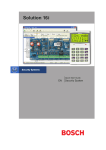
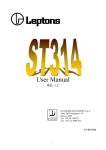



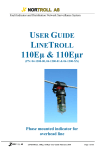
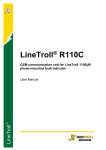
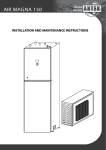
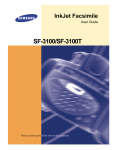
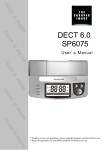
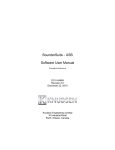
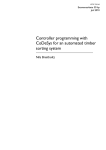
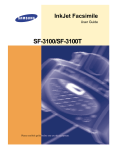

![WLg-ABOARD /N[P] - ACKSYS Communications & Systems](http://vs1.manualzilla.com/store/data/006361248_1-d85c19beabe1f63c614e17883b6a3a3e-150x150.png)
